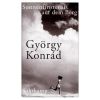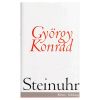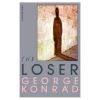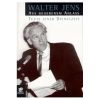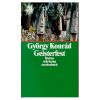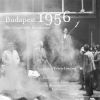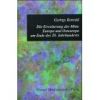
|
Falevelek a szélben Magvető kiadó, 2017 |
Fatefulness ( István Deák, The New Republik, 2007)
A guest in my own country: A Hungarian life - Other Press Books, 2007
April 2, 2007
Fatefulness
By Istvan Deak
Istvan Deak is Seth Low Professor Emeritus at Columbia University and the author of Essays on Hitler's Europe (University of Nebraska Press).
A Guest in My Own Country: A Hungarian Life
By George Konrad
Translated by Jim Tucker
(Other Press, 303 pp., $15.95)
For many years and through diverse political systems, the writer George Konrad has served as one of Eastern Europe's leading intellectuals, and can be rightly considered the living conscience of a deeply disturbed society. As befits many an Eastern European, it is a near-miracle that he reached manhood. In this memoir, ably and accurately translated by Jim Tucker, he tells that in the spring of 1944, when he was eleven, the Gestapo dragged away his parents from Berettyoujfalu, a small town in eastern Hungary. By then the German army had been occupying Hungary for a few months. Without any real guidance from the Jewish community leaders, but sensing that something terrible was about to happen to them all, the boy dug out the 30,000 pengs (approximately $300,000 in contemporary dollars) that his father had hidden in his shop, and gave it to a non-Jewish lawyer to secure a permit for himself, his sister, and two cousins to move to Budapest. A day after the four children boarded the train, the Hungarian authorities collected the thousand-odd Jews of their town for deportation to Auschwitz. Of the two hundred Jewish children living in , only Konrad, his sister, and the two cousins survived, as well as two twins who had been subjects of testicular experiments at Auschwitz, and Zsofi, another cousin of Konrad, who was fourteen at that time and whom the dreaded Dr. Mengele had placed into the group judged capable of work.
As Konrad explains, 30,000 pengs was what a large house cost in the countryside. (My own family papers show that, in the capital, it bought a two-bedroom apartment in a residential neighborhood.) The deal made with the lawyer and, through him, with the local authorities proved the astuteness and the foresight of the little boy. It also proved that, more than in puritanical Germany, money in Hungary could often buy security. Although Konrad was to face more dangers and would have other bare escapes, luck was with him in Budapest, where he stayed with relatives. The regent of the country, Admiral Miklos Horthy, who in the spring and early summer of 1944 willingly handed over to the Germans all but the younger adult males among the Jews in the countryside, decided in July 1944 not to surrender the Jews of the capital. Like many other things, this move, too, set apart the, the assimilated, and those with good Christian connections--the three qualifications being almost identical--from the poor, the unconnected, and the unassimilated. Earlier, when Konrad's mother went on shopping trips to Budapest, she stayed in one of the city's plushest hotels; now he had to carry his own suitcase. Yet he was safe, at least for a while.
The German occupation of Hungary on March 19, 1944, and the subsequent deportations, came as a complete surprise to the country's Jewish community. Very few had heard of the extermination of the Jews in Poland, and even fewer believed that the same could happen to them. Almost no one in Hungary remembered an early warning by Theodor Herzl, the Hungarian-born founder of modern Zionism, who, a year before his death, wrote to a Jewish member of the Hungarian parliament, that "the hand of fate shall also seize Hungarian Jewry.... And the later that occurs, and the stronger this Jewry becomes, the crueler and the harder shall be the blow, which shall be delivered with greater savagery. There is no escape."
Herzl was a great prophet, but in this case he was only partly correct. Even though about 60 percent of all those whom Hungary's new racial laws treated as Jews perished during the Holocaust, the proportion was incomparably lower among those who had converted, had married non-Jews, and were wealthy professionals. Indeed, Herzl's warning, largely ridiculed in Hungary at that time, might not have applied to himself and to his assimilated relatives. Herzl could well have survived the Holocaust--as did, for instance, one of his first cousins, a famous writer, whom the cabinet office specifically protected. Konrad's parents, too, eventually returned from deportation.
In time, George Konrad received nearly all of Europe's major literary and cultural prizes, except for the Nobel Prize, which in 2002 went to Imre Kertesz, a fellow Hungarian. Unlike Konrad, Kertesz had gone through Auschwitz and Buchenwald. In Fatelessness, his fictionalized autobiography, he tells of a Jewish boy, three years older than Konrad was in 1944, whom cruel fate had changed from a Budapest resident into a resident of the countryside. Although this was only for a few hours, it was long enough for the monstrous country gendarmes to pick him up and to send him to Auschwitz.
At the Frankfurt Book Fair in 1999, which the Fair organizers designated as a "Hungarian year," the organizers selected four Hungarian writers for special attention, three of whom, Peter Nadas, George Konrad, and Imre Kertesz, are of Jewish background. The fourth writer, Peter Esterhazy, is a member of one of Central Europe's most illustrious aristocratic families, reinforcing the widespread impression that even today nothing important can happen in Hungary without princes, counts, barons, and Jews. Yet both aristocrats and Jews have been cruelly persecuted, humiliated, and partly wiped out by various tyrannical regimes.
Perhaps the most prestigious honor bestowed on Konrad was the Karlspreis, or Charlemagne Prize, awarded by the city of Aachen, Emperor Charlemagne's city. It is given "for the most valuable contribution in the services of Western European understanding and work for the community, and in the services of humanity and world peace." Konrad undoubtedly deserved the honor for his socially conscious novels and essays. The committee also appreciated the strong stand he has always taken on behalf of justice, even if it meant infuriating his liberal friends. This was certainly the case during the Kosovo crisis. Konrad steadfastly condemned the American bombing of Serbia, which he saw, besides its inhumanity, as support given to extreme nationalism against the supranational idea. Yet as a novelist and an essayist, Konrad still must struggle, as must other Eastern European writers, against the widespread assumption that his fame has been due not only to his talent but also to the courageous stand that he took against tyranny--as if the most that can be asked or expected of a writer is dissidence, and the right politics.
Berettyoujfalu, meaning "New Village on the Berettyo River," was one of the many large settlements on the Great Hungarian Plain in which peasants traditionally sought mutual protection against marauders, while spending only the summer months in cottages located on their outlying fields. It was a modest town, but it had a highly cultured neighbor, Nagyvarad, where the theater and literary cafes were thriving. After World War I, however, the Paris peace treaties cut Nagyvarad and the rest of eastern Hungary away from Konrad's town, causing its intelligentsia to cast its eyes increasingly on faraway Budapest.
Life was good for Konrad's father, a seller of agricultural machinery and other hardware, which made him the biggest taxpayer in the region. What Konrad tells about his childhood sounds similar to that of many other Eastern European Holocaust survivors: a loving family, a hard-working decent father; trustworthy Jewish clerks and non-Jewish workers in the father's shop; a somewhat prim governess brought in from abroad and devoted maids brought in from the countryside. Sometimes the stories vary only regarding the nationality of the governess, Austrians being less fashionable than Germans, Germans less fashionable than the French. English-speaking nurses or governesses were the privilege of the highest Jewish and non-Jewish aristocracy. The Konrads being upper bourgeois, the children benefited from the presence of a German governess.
Another characteristic of the memoirs of Eastern European survivors, and also of the memoirs of Konrad, is their emphasis on governmental and popular anti-Semitism before the war, from which, however, their own neighborhood and school seemed to have been largely exempt. In any case, the Konrad children attended a Jewish elementary school, where the level of education was far higher than in other schools, and where they were brought up in a thoroughly patriotic Hungarian spirit.
What explains, then, the indifference, if not the outright hostility, of so many neighbors when the authorities began "to take away the Jews"? The answer to the puzzle is, mainly, envy and greed, as Jan T. Gross recently explained so well in Fear: Anti-Semitism in Poland After Auschwitz. Gross discusses only Poland, but, in respect to the public's treatment of the Jews during the Holocaust, all Eastern European countries with a large and economically successful Jewish population were the same. Contrary to widespread beliefs, religious anti-Semitism and the feeling of being exploited by Jews were not a crucial factor among the rural population. People no longer experienced the Jews as money-lending innkeepers; "their" Jews were lease-holders of aristocratic estates, shopkeepers, and doctors, all of whom tended to treat the peasants more decently than what they had been used to.
But even in Hungary, where anti-Semitism flourished more among the middle classes than among the lower classes, envy at the sight of Jewish children wearing white gloves on holidays, their fine homes, their facility with foreign languages, their books, their urban relatives and acquaintances, all caused the vast majority of the population to abandon the Jews in the hour of need. Violent attacks on Jews occurred mainly where the traditional authorities had ceased to function, as in German-occupied Poland and the Baltic states. In Hungary, and in other countries with a well-functioning administrative system, the deportations were an orderly and bloodless process, with the population acting mainly as spectators. Once the Jews left for "an unknown address," however, their homes were immediately emptied of their contents. When the Konrad children returned home after the war, they found nothing but devastation wrought by the neighbors and by Red Army soldiers.
When he boarded the train, Konrad explains, his childhood ended; and with it also the semi-feudal lifestyle of the Hungarian countryside. In Budapest, the children lived in crowded places while Regent Horthy was preparing to surrender the country to the Soviet army, which by that time was already in Hungary. His attempt was thwarted by an SS-led coup on October 15, 1944, which put the Arrow Cross leader Ferenc Szalasi, a fascist fanatic, in power.
With Horthy's forced transfer to Germany, the uncertain protection that he had extended to the Jews of the capital came to an end. Arrow Cross thugs took over the streets, killing thousands of Jews, while Adolf Eichmann, who had come back to Budapest, marched tens of thousands toward the Austrian border, where most of them perished. "The armed men in armbands had plenty of people to shoot," Konrad recalls, "though they had begun to sense they couldn't execute every single Jew." and so "the mood for murder flared up and flagged by turns." During the Soviet siege of the city, all was anarchy. It could therefore happen that while thousands were dragged to the Danube shore to be shot into the ice floes, one of Konrad's relatives, who was serving in a Jewish forced labor unit, was granted leave to visit his family at Christmas.
Again, money helped, and so did good connections. The Arrow Cross regime crammed nearly eighty thousand Jews into a newly erected ghetto, the only ghetto in Hitler's Europe at that time. There, except for those who were killed by roving bands of Nazis, the inhabitants had a decent chance of survival. At least twenty thousand others survived in hiding with Christian families, and by obtaining forged identity papers. Some of these papers had been bought, others had been freely given. Another twenty or thirty thousand purchased or somehow secured real or forged letters of protection from different neutral legations in Budapest--as did, for instance, Aunt Zsofi, the children's protector. Yet the letters of protection handed out by the likes of Raoul Wallenberg, or forged by Zionists, did not guarantee safety. What counted in Konrad's case is that he and most of his Budapest relatives were alive when Red Army units freed their district, on January 18, 1945.
But then new trouble began: the Russians "checked Aunt Zsofi's papers and eyed her and my sister like cats eyeing sour cream." One of the worst aspects of liberation or occupation was the Red Army's utter unpredictability. Konrad, whose life had, after all, been saved by the arrival of the Soviet soldiers, found them "unfathomable, unsusceptible to understanding ... one would give the locals gifts; another would rob them. The same man often did both. There was no particular need to fear that the Germans would rape a woman, whereas these boys couldn't wait to unbutton their flies." Add to this the fact that thousands of civilians, whether Jews or non-Jews, were dragged away into POW camps from which the majority did not return. Murder-rapes by Soviet soldiers were not uncommon, especially in the countryside, but at least none of this had the characteristics of genocide.
At the end of February 1945, Konrad returned to his hometown. Traveling on the roofs of railroad cars, he found only the ruins of his earlier life. Even today, he writes, the town's synagogue is a warehouse and the Jewish cemetery is utterly neglected. But were the cemetery in excellent shape, we must interpose, it would still not put into doubt the irrevocable victory of the anti-Semites and their practice of ethnic cleansing. Consider the Vienna Central Cemetery, where the large Jewish section with its elaborate tombstones and vaults has been freed recently from much of its jungle-like foliage by dedicated young Austrian volunteers. This noble gesture will not restore Jewish cultural and economic life in the Austrian capital.
In Hungary and Romania, after 1945, many Jewish survivors, most of them former forced laborers within the Hungarian army, had to start a new life without their families. In business, they were amazingly successful, whether in Budapest or in Transylvania, where Konrad was staying with relatives for a while. Amazingly, even though the number of Jews in Hungary had vastly diminished during the war, the survivors were largely responsible for the revival of private commerce and industry, which the communists encouraged, if temporarily. Moreover, careers in the administration, politics, the judiciary, the police, and the army officer corps were suddenly open to Jews. And small wonder, since, from the Soviet point of view, the Jews alone were fully reliable.
All this was transitional, however, because the Jews were steadily leaving Eastern Europe, with nearly thirty thousand fleeing Hungary following the suppression of the Hungarian revolution in 1956. Moreover, the communist regimes were gradually replacing the Jewish cadres with newcomers raised from the lower classes. Still, the anti-Semitism that exists in Eastern Europe today is mainly to be attributed--aside from the traditional religious element, of course--to the memory of Jews in command positions after the war.
True, the expulsion of the German ethnic minority immediately after the war eased the housing shortage at least in some regions, but the hunger for space and goods only increased under Stalinist rule, when hardly any private homes or consumer goods were produced. The Soviet-style communal apartments were often shared by the original Jewish owners, their homeless relatives, the family that had acquired the place following the deportation of the Jews, and a family of new workers' cadres. It is a miracle that more of the tenants did not kill one another.
The first year after the war was marked by an astronomical inflation, which created unheard-of opportunities for the skilled and the hardy, but in which neither Konrad nor his parents participated. His father and mother came back from Austria at the end of 1945. The father re-opened his shop with the help of a small hoard of gold that he had hidden. Again, business was thriving, but not for long: in the late 1940s the communist regime nationalized the hardware store and everything else in sight.
Following his move to Budapest, Konrad was admitted into one of the best high schools, where he met friends who would later also become well-known intellectuals. In school he learned, among other things, to chant, "Stalin is our battle, Stalin is our peace, and the name Sta-a-a-lin will make the world a better place"; but while many of his generation of middle-class Jews joined the party or fled abroad, he did neither. His family wanted him to become a medical doctor, but he was a class enemy with an "X" next to his name on his "cadre card," and so medical training was out of the question. He was allowed to study literature at Budapest University--Hungarian literature only. In 1955, he was expelled from the university and readmitted only following intervention by his professors. By then he was already beginning to work for a small literary journal.
In 1953, the post-Stalinist Soviet leadership replaced the tyrannical Matyas Rakosi as Hungary's prime minister with the more moderate communist Imre Nagy. A number of economic reforms followed, and many political prisoners were released. This, as well as Khrushchev's secret speech at the Twentieth Party Congress in February 1956, led to a political ferment within the Communist Party that proved to be unstoppable. Still, the revolution that started on October 23, 1956 took everyone by surprise, even those who had brought it about, namely the often Jewish, reform-minded communist intellectuals and the university students.
As mass demonstrations turned into sporadic shootings, Soviet tanks intervened. They were stopped by a hastily armed ragtag force made up of young workers, students, individual soldiers, and common criminals. The revolution triumphed: democratic parties and a multi-party government were soon formed, and, on November 1, Imre Nagy's revolutionary government proclaimed Hungary's neutrality. There followed a few days of public euphoria. Then, on November 4, the Soviet tanks came back, and gradually wiped out all resistance.
During these incredible events, Konrad was one of the few intellectuals to carry a submachine gun. He did not use it, though. While wandering the streets of Budapest, he notes, he "was asked by more than one woman if I would be kind enough to rub out one or another neighbor--you know, the one in the fourth-floor corner flat. I did nothing to appease the popular demand for murder." Whether or not it is true, the story fits well with the spirit of the time. Luckily for him, Konrad escaped punishment during the terrible years of post-revolutionary communist retribution, when hundreds were hanged and thousands were imprisoned, among them some of Hungary's most famous writers, poets, and philosophers. Those executed or imprisoned included many Jews.
While most of his friends, lovers, and cousins (as well as his sister) left Hungary following the Revolution, Konrad became a children's welfare supervisor, about which he wrote his first book, an extraordinary novel called The Case Worker, which appeared in 1969 (and in English five years later). Its horror stories of alcoholism, abuse, misery, and neglect would be familiar to a New York City social worker, but to the Hungarian public, until then generally kept in the dark about bad news, it came as a great shock.
There followed two sociological studies, written in conjunction with Ivan Szelenyi, today a well-known sociologist at Yale University. The more important of the two books, The Intellectuals on the Road to Class Power, argued that, under socialism, the proletariat was the most oppressed class and the intelligentsia the dominant force in society. Or, as Konrad now explains in his memoir, under communism "the intelligentsia was ensuring that the system functioned effectively by refraining from calling the power hierarchy into question, while perceiving itself as an abused victim and thereby absolving itself of responsibility." The manuscript of this work led to the arrest of the authors in October 1974, during a period of Soviet-ordered "sharpening of the class struggle." The two were offered the chance to emigrate. Szelenyi accepted, and moved to Australia; Konrad refused, yet he too was released from police custody.
The terrible era of purges in the late 1950s and early 1960s gave way to amnesties, at least for the intellectuals; but workers, students, and soldiers who had taken up arms were treated as common criminals, and some remained in prison.



















